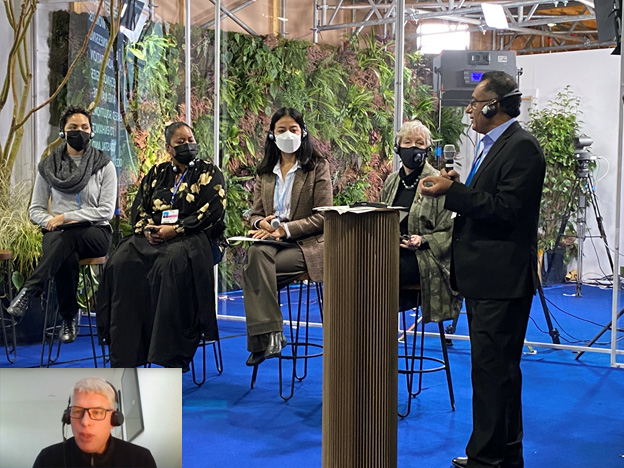Coastal communities are facing ever-increasing risks due to climate change, with heat waves, storm surges and sea level rise threatening lives and livelihoods. Innovative adaptation initiatives are increasingly being developed and implemented, but are urgently needed at a larger scale to help enhance community resilience to these severe and unprecedented impacts. Integrating technology and ecosystems into national adaptation planning to enhance resilience is critical to achieving the Paris Agreement. Scaling up such measures will help achieve multiple benefits for adaptation, mitigation, biodiversity conservation and sustainable use.
Nature-based solutions and integrated technological adaptation strategies were the focus of an event on 8 November 2021, at the Nature+ Zone Pavilion of the UNFCCC Conference of the Parties (COP) at its 26th session in Glasgow. It was organised by the Technology Executive Committee (
TEC), in collaboration with the International Union for Conservation of Nature (
IUCN), the Friends of EbA (
FEBA) network and the Nairobi Work Programme (NWP)
expert group on oceans.
This event is the culmination of a series held in September through November 2021. This final event of the series focused on discussing opportunities for resourcing and scaling of integrated technological and ecosystem-based approaches to climate change adaptation at various levels of policy integration, financing, capacity building and implementation.
Opening the floor, the senior director of UNFCCC secretariat, Daniele Violetti, said: “Hybrid technologies are urgently need on a scale where they can be deployed efficiently, enabling the involvement of multiple stakeholders bringing together the technical, policy, business, financial and social perspective to the table.”
In his keynote speech, Md Mostafa Kamal, Secretary, Ministry of Environment, Forest and Climate Change of Bangladesh, emphasised the need to legitimise the concept of adaptation technology, taking the example of mangrove conservation in India and Bangladesh. Noting that a substantial population of the world live at the interface of land and sea, he highlighted vulnerabilities and exposure to a range of natural disaster like cyclones, tidal waves, coastal flooding.
Adelle Thomas, Senior Research Associate, Climate Analytics & University of Bahamas, noted the availability of climate finance for adaptation is far behind that for mitigation. She said, “The total share of climate finance has been decreasing over time… For hybrid approaches to be successful, we also need to move from project-based funding to consider the long-term costs of these programs.” She underscored the need to acknowledge the limitations of hybrid approaches and demonstrate their links to mitigation objectives.
Hans Pietersen, Senior Advisor of International Affairs, Ministry of Infrastructure and Environment, Netherlands, highlighted innovative strategies to protect the Dutch coastline. The ‘Room for the River’ and ‘Sand Motor’ initiatives enhance resilience while providing other social and economic benefits to communities beyond adaptation.

Ko Barrett, Senior Advisor for Climate, NOAA and Vice Chair, IPCC, noted that adaptation technologies such as enhanced forecasting, flooding safeguards and insurance are critical to enhancing resilience. She added that resilience is also fundamentally achieved by empowering and supporting communities on the frontlines by bringing financial, legal, policy and human resources. Continuing this local emphasis, Gwendalyn Sisior, Ministry of Agriculture, Fisheries, and the Environment of the Republic of Palau, spoke about the importance of identifying locally relevant solutions to build the resilience of ecosystems and communities. She cited the example of taro crop which are mainly grown in coastal area, but losses have occurred due to sea level rise and salt-water intrusion.
Carolina Fuentes, Secretary to the Board and Head of Governance Affairs, Green Climate Fund, recognised that projects in coastal areas and marine ecosystems are underrepresented globally. She underscored the need to work hand in hand with countries and communities to implement projects in a culturally appropriate manner, in a way that achieves both mitigation and adaption potential.
Ali Raza Rizvi, Global Coordinator for Adaptation and Disaster Risk Reduction and Senior Advisor for Resilience, IUCN, closed with a call to end silos, venture beyond our comfort zones, and reject business as usual approaches to adaptation. In his closing remarks, TEC Chair, Stephen Minas thanked TEC partners, IUCN FEBA, the Nairobi work programme and the speakers for their contribution in organizing extraordinary series. He further stated, “We have learnt about critical role of finance, role of law in creating change. We live in a hybrid world and hybrid solutions are inevitable, how can we craft them in the least harmful manner for ecosystems and for people.”
The outcome of this event and other two events in this series on ocean and coastal adaptation will be applied to produce a policy brief and recommendation to the Conference of Parties (COP).
For more information: Read more about this event and previous events in this ‘Technology Day’ series is available here.